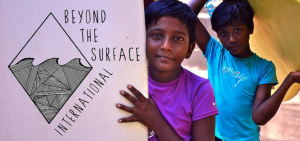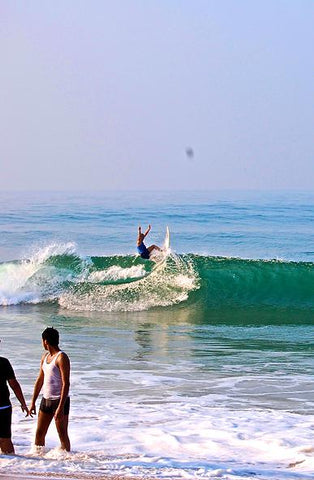
ein gespräch über soziales surf-engagement, künstliche wellen und die auswirkungen des surf-tourismus auf die umwelt.
die us-amerikanische surferin emi koch gründete die gemeinnützige organisation <<beyond the surface international>> (BTSI). die 26-jährige setzt das surfen ein, um benachteiligten jugendlichen in entwicklungs- und konfliktregionen wie indien, südafrika, peru, mexiko und im gaza streifen selbstwertgefühl, freiheit und freude zu vermitteln. vor ort initiiert sie – gemeinsam mit einheimischen und surftouristen – soziale projekte und aktionen zum schutz der umwelt. wir haben mit emi über ihr soziales engagement, künstliche wellen und die auswirkungen des surf-tourismus auf die umwelt gesprochen.
it is hard to keep track of all the projects you are involved in. can you explain us briefly what you are doing?
as a surfer for billabong women, I apply my sponsorship to support surf for social good initiates related to youth empowerment, ocean conservation, and the celebration of coastal community identity. these are my greatest passions.
when I was 19 years old, I have founded a small non-profit organization, <<beyond the surface international>>, a network of surfing for social good projects worldwide. BTSI lives online and is meant for knowledge-sharing, fostering collaborations, bridging socioeconomic divides, and celebrating surfing as a tool for youth empowerment. fair surf for social good is a conference series for positive social change through surfing that myself and a few other women started just last year in an effort to connect people within our small niche of the industry.
in may 2014, I attended an audiovisual workshop in peru facilitated by the lobitos cinema project. I was disillusioned by film projects entering communities, capturing stories, grabbing imagery, and then leaving, never to include local people in the process. LCP’s founder, nicolás landa, introduced the participatory method where locals are storytellers and the filmmakers facilitate their process. nico and I decided to create our own project together celebrating coastal culture in this way called, coast 2 coast. as we began, we discovered quite quickly that people were sharing the same stories all relating in someway to the ocean’s collapse. we are developing the project as an interactive audiovisual platform for ocean activism with a mobile series of participatory workshops in local coastal communities.

what is your motivation behind your non-profit organization beyond the surface international?
my main motivation behind <<beyond the surface international>> is to celebrate pure stoke and the amazing grassroots organizations across the world that are facilitating programs for local youth to experience that divine bliss wave-riding evokes deep in your heart. if you surf, you know exactly what I mean. the surf industry has gone way beyond its roots. BTSI is a project documenting and celebrating stoke and a resource to connect surfing for social good programs with each other and the surf industry.
why do you think surfing is particularly appropriate to trigger social change?
surfing is radical. not in a cliche way (many surfers, including myself, love to say the word rad) but when surfing first became popular, it was counter-cultural and grabbed people’s attention. but wave-riding is very simple, it is playing with energy. that is genuine and powerful. people cannot mute what they see nor what they feel. if surfing is applied to fuel a positive movement, the possibilities are endless.

could you describe one of your projects, its aim and effect?
in kodhi bengre, karnartaka, india, I worked with my friends, ishita and tushar at their surf school, the shaka surf club. ishita is recognized as the first professional female surfer in india and an inspiration to many girls in india and beyond. together, in the village, we created an upcycling project to build a <<peace bench>> at a local prawn shop between the muslim and the hindu sides of the village. we invited kids from the two sides to surf together and then we collected trash from the beach. over the course of two months, we filled discarded plastic water bottles with the trash so they became hard like bricks. then, together we built the bench, paved over the bottles with cement, and the kids decorated the bench with sea shells. the group of kids still surf together today and the bench is a gathering spot to watch the sunset.

how did you start surfing? who taught you how to surf?
my dad was a lifeguard and introduced me to the ocean at a very early age. the ocean became my playground and one of the fun things to do at this playground was go surfing. my dad taught me how to surf but more importantly, how to respect the ocean as our greatest life support system on this planet.
did or do you have a role model?
oh man, I have so many role models! I really respect all the great spiritual teachers in human history, from the dalai lama to jesus to martin luther king jr. to rumi. I also really admire children and their enthusiasm for life. I think most of living my role models are under 13 years old.
<<beyond the surface international>> also operates as a travel platform. what is the intention?
there are two intentions behind <<beyond the surface international>> as a travel platform. one is to simply share with people that there is another option besides your average surf trip where local people benefit directly. people do not necessarily need to take this route but at least they know that this option exists. two is that, if people are interested, we can set them up with a really unique experience, not just visiting a coastal community but engaging with local families, eating local food and forming relationships unlike any normal traveler might.
you collaborate with the center of surf research to understand the impact of surf tourism. what are your insights so far?
I have come to understand that surf tourism can be super one-sided. some people say that surfing is a selfish sport, individuals searching for his or her perfect wave. surf tourism can also be very selfish, exploiting local communities as we focus only on the waves and do not care to investigate where exactly our money is going or how we are impacting a local community, environmentally and culturally. there is a larger movement now to change this destructive pattern but we still have a long way to go.

how do you deal with the contradiction between environmental damage through co2 emissions and traveling across the globe to catch a wave?
this is a hard one. to be honest, I am ashamed to say I have not given it so much thought. thank you for asking this question. I take a lot of airplanes. I would hope that the positive work we do with communities could some how offset the damage we did by taking a plane through co2 emissions, but I understand the world does not work like this. I think I try to take the most environmentally-friendly route of transportation when possible but this is something I personally need to examine a bit more. the ocean absorbs 1/3 of all human co2 emissions but our co2 rate is increasing and it is progressively affecting the ocean system, causing the acidity of sea water to increase. in some areas of the ocean, this creates <<dead zones>> and marine life cannot exist. we all have a role to play in ocean conservation.
what is your opinion on artifical surfspots?
to be honest, the only “artificial” wave I have ever ridden was in munich, germany on the river. that was super hard and I tremendously respect people who can absolutely shred this wave. but in general, I am not a big fan of artificial surf spots. in the ocean, if you go surfing for one hour, you might be surfing on a wave for a total of ten minutes in that hour. in my opinion, the majority of surfing is about time spent in the ocean and riding that natural energy. it is like asking which tastes better, an organic apple or genetically modified apple? the organic apple might not be perfect but I would pick it over the gmo apple any day.
how often do you surf these days? do you also have time for other sport activities?
I have to visit the ocean at least once a day. if I am not with a board, I am bodysurfing with my fins. I love volleyball as well and soccer, though I am not very good at the latter. I do not count yoga as a sport but I try to include the practice daily, if possible.
do you have a favorite surfspot that you can share with us?
yes, it is a little point break in india called edava. the water is crystal clear and the waves are like a machine, one perfect pealing left, one after another. there is a beautiful mosque at the beach’s entrance and along the shore, artisanal fishermen
thanks for the interview, emi!
links zum thema:
beyond the surface international






